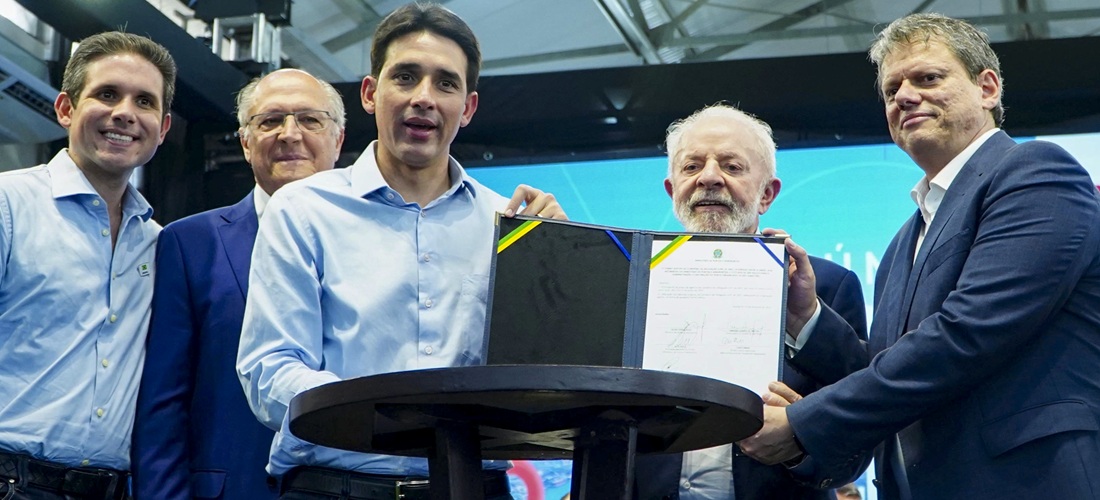
President, governor unite for R$6bn tunnel launch
Feb, 28, 2025 Posted by Gabriel MalheirosWeek 202509
President Lula da Silva and São Paulo Governor Tarcísio de Freitas joined forces at a public event on Thursday (27) to launch the bidding process for the Santos-Guarujá tunnel, a long-anticipated project in the Baixada Santista region that has been a topic of discussion for over a century. This initiative will progress through a collaboration between the federal and state governments as well as the private sector.
Set to be the largest project under the new Growth Acceleration Program (PAC), the tunnel will require a total investment of R$6 billion, with R$5.1 billion shared equally between the federal and state governments. The remaining funds will be provided by the private company that wins the auction scheduled for August 1. The tunnel will measure 1.5 kilometers and include three traffic lanes in each direction, an exclusive lane for light rail transit (VLT), and access for pedestrians and cyclists.
The event, bringing together two likely opponents in the next presidential race, was marked by speeches advocating for cooperation between governments beyond political differences and reinforcing republican civility. However, it also featured jeers directed at Mr. Freitas, an ally of former president Jair Bolsonaro, as well as chants from Lula supporters opposing amnesty for those involved in the 2022 coup attempt.
Mr. Lula and Mr. Freitas sought to demonstrate a harmonious working relationship, emphasizing the importance of “civilized relations between federal entities” and “governing for the people.” They exchanged compliments and hinted at future collaborations. Mr. Lula noted that allies disturbed by images of them together should expect “many more photos” and expressed his intent to launch a housing program to eliminate the stilt houses that remain in Baixada Santista.
The audience, largely composed of Mr. Lula supporters, initially booed Mr. Freitas when he referenced R$7.5 billion in investments in the region by Sabesp, São Paulo’s sanitation company, which was privatized under his administration. At that moment, Mr. Lula raised his hands and shook his head in disapproval, prompting the crowd to quiet down.
Despite the tension, Mr. Freitas maintained a conciliatory tone and was later applauded when he thanked Lula for prioritizing the tunnel and stressed that “it is possible to sit at the table and build together.”
Earlier in the day, in an interview with TV Record, Mr. Lula expressed his desire to “bring Brazil back to normality” by fostering respectful relationships with governors and mayors. “Once elections are over, we must set aside party affiliations, forget past disputes, and work together because, for better or worse, the people have made their choice,” he said. He also made an indirect jab at Mr. Bolsonaro, saying, “We had a president who refused to speak with governors, who traveled but never engaged in dialogue.”
During the ceremony at the Port of Santos, Mr. Freitas remained silent as speakers defended democracy and chanted “No amnesty”—a position he has previously opposed.
Vice President Geraldo Alckmin took the stage to contrast the current administration with past tensions, saying, “While some were plotting the assassination of their opponents, President Lula promotes dialogue and extends his hand for the benefit of the people and Brazil’s development.” His remarks referenced an ongoing Federal Police investigation into an alleged plan to kill President Lula, Mr. Alckmin himself, and Supreme Court Justice Alexandre de Moraes.
Calls against the proposed congressional amnesty bill surfaced again after House Speaker Hugo Motta took the microphone. While he praised Mr. Lula and São Paulo governor for “setting aside differences to build good politics,” he also highlighted what he sees as a broader public sentiment: “The people are tired of conflicts and radicalism. They don’t want to live under constant tension. They want what’s happening here in Santos to happen across the country—because, in the end, the people are the ones who benefit.”
Chief of Staff Rui Costa underscored past threats to democracy, referencing the failed coup attempt. He stressed the importance of prioritizing collective interests over personal disputes and took a swipe at Mr. Bolsonaro, recalling his own struggles as governor of Bahia (2015–2022). “I was never invited to sit next to the president to sign any agreement,” he said.
Mr. Lula reinforced this sentiment by criticizing the previous administration’s use of the Brazilian Development Bank (BNDES). “Some presidents used BNDES as a political weapon against their adversaries,” he said. “I will never withhold support from governors and mayors just because they didn’t vote for me. That’s not why I sought the presidency again. I did it to show that we can solve this country’s problems in a civilized way.”
Mr. Lula and his allies also used the platform to distance themselves from Mr. Bolsonaro’s policies, condemning plans to privatize the Port of Santos—an initiative shelved with the Workers’ Party return to power—and criticizing the financial market’s concerns over rising employment figures. Reacting to recent job creation data, which showed 137,000 new positions in January, Mr. Lula scoffed at claims that higher employment could fuel inflation. “My God, how can anyone think it’s bad that Brazil is creating jobs?” he said.
By Rafael Vazquez, Joelmir Tavares e Cristiane Agostine, Valor — Santos and São Paulo
Picture: Sergio Barzaghi / Sao Paulo State Government
Source: Valor International
-
Meat
Aug, 04, 2023
0
BRF closes joint venture with halal meat company in Saudi Arabia
-
Economy
Jul, 22, 2021
0
In a year of records, 16 curiosities regarding the January-June trade flow, by Marcos Troyjo
-
Ports and Terminals
May, 14, 2020
0
Uncertainty at Buenos Aires Port as concessions expire without definition of path ahead
-
Oil and Gas
Dec, 14, 2021
0
EU to propose joint purchase of gas in the bloc, given price hikes

